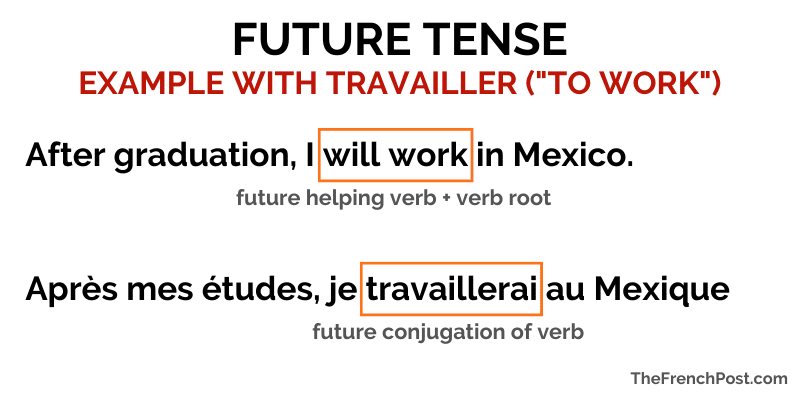
The French future tense (le futur simple) is exactly what it sounds like—how to talk about things that will happen in the future. Very simple concept, but it’s a little different to form in French compared to English.
French Future Tense Vs. Future in English
In French, talking about the future means you have to use an entirely new verb conjugation, because French doesn’t have helping verbs the way English does. In other words, there’s no “will,” as in, “They will do something,” in French.
Here’s an example of differences in talking about the future using the verb “to work”, or travailler.

As you can see, “will work” is a single word conjugation in French. (Sidenote: there is also a “near future” sentence construction that does work the same way in both French and English and involves saying something is “going to” happen. You can read our lesson on it here.)
How to Form the French Future Tense
Learning the French future tense conjugations is pretty easy, because the future tense has no irregular verb endings (we’ll discuss irregular root forms in a second).
All future tense verbs follow the same ending pattern. The ending varies by whether it’s singular or plural, and it’s a first, second or third person noun or subject pronoun (just like all other French verb conjugations).
| French Future Tense | |
| je [infinitive] + ai | nous [infinitive] + ons |
| tu [infinitive] + as | vous [infinitive] + ez |
| il [infinitive] + a | ils [infinitive] + ont |
Do the future tense verb endings in the “boot” look familiar to you? They’re the same as the present tense conjugation of avoir! And having -ons and -ez endings in the nous and vous conjugations should look familiar to you in the present tense, as well.
Let’s talk about conjugating the future tense with regular verbs first.
Regular Future Tense Verbs
The “normal” way to conjugate a verb into the future tense is just to add the endings straight onto the infinitive form of the verb. For example, for both -er and -ir verbs:
parler → je parle (present) → je parlerai (future)
dormir → il dort (present) → il dormira (future)
For verbs that end in –re in the infinitive form, drop the final e (this is so you don’t have double vowel sounds).
rendre → je rends (present) → je rendrai (future)
perdre → il perd (present) → il perdra (future)
Irregular Future Tense Verbs
There are about a dozen common irregular verb root forms (including all of the four most fundamental French verbs), and a few others that are “partially” irregular (usually this means they change in the “boot”, and have regular future tense conjugations in the nous and vous forms).
The French future “root” form of the verbs is also the same root forms used in the conditional tense, just with different endings. So you’ll only have to memorize one root form for each irregular verb, and then just adjust the ending according to whether it’s the future or conditional tense.
| Irregular verb | Future tense root form |
| être | ser- |
| avoir | aur- |
| falloir | faudr- |
| aller | ir- |
| faire | fer- |
| devoir | devr- |
| pouvoir | pourr- |
| savoir | saur- |
| venir | viendr- (same format for devenir and revenir) |
| vouloir | voudr- |
| voir | verr- |
| pleuvoir | pleuvr- |
| valoir | vaudr- |
Spelling changes in the French future tense
Finally, there are a few other verbs that change spelling slightly to accommodate the future (and conditional tense) conjugations while keeping the desired spelling patterns and/or pronunciation intact.
1) Doubling the final consonant
For verbs that end in a single l, double the l. For example:
Appeler → appeller + future ending and rappeler → rappeller + future ending
For verbs that end in a single t, double the t. For example:
Jeter → jetter + future ending and projeter → projetter + future ending
2) Certain verbs that end in -yer
Replace the y with an i. Example verbs include: essayer, envoyer, ennuyer, nettoyer, and payer.
For example:
Nettoyer → je nettoierai
3) Changing the e to an accent grave è
For verb spellings that would make the second-to-last e not pronounced, the e gets an accent grave è to make it a substantial sound. Example verbs include: amener, promener, lever, acheter, and emmener.
For example:
Promener → “je promènerai”
Next Steps
That’s it for the future tense! If you want to fully master how you speak about the future, check out how to talk about the “immediate future” (which is a simple sentence construction and not its own tense). And this is also probably a good time to make sure you’ve mastered the conditional, as well.



